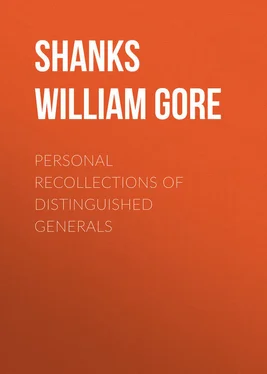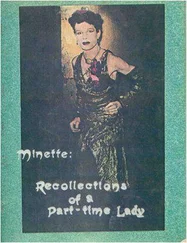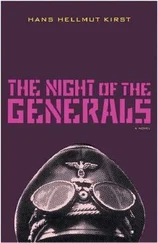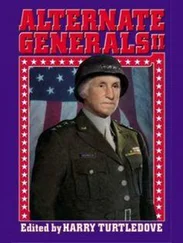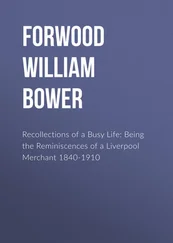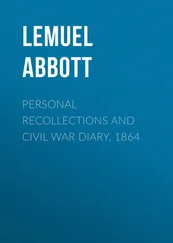William Shanks - Personal Recollections of Distinguished Generals
Здесь есть возможность читать онлайн «William Shanks - Personal Recollections of Distinguished Generals» — ознакомительный отрывок электронной книги совершенно бесплатно, а после прочтения отрывка купить полную версию. В некоторых случаях можно слушать аудио, скачать через торрент в формате fb2 и присутствует краткое содержание. Жанр: foreign_antique, foreign_prose, на английском языке. Описание произведения, (предисловие) а так же отзывы посетителей доступны на портале библиотеки ЛибКат.
- Название:Personal Recollections of Distinguished Generals
- Автор:
- Жанр:
- Год:неизвестен
- ISBN:нет данных
- Рейтинг книги:5 / 5. Голосов: 1
-
Избранное:Добавить в избранное
- Отзывы:
-
Ваша оценка:
- 100
- 1
- 2
- 3
- 4
- 5
Personal Recollections of Distinguished Generals: краткое содержание, описание и аннотация
Предлагаем к чтению аннотацию, описание, краткое содержание или предисловие (зависит от того, что написал сам автор книги «Personal Recollections of Distinguished Generals»). Если вы не нашли необходимую информацию о книге — напишите в комментариях, мы постараемся отыскать её.
Personal Recollections of Distinguished Generals — читать онлайн ознакомительный отрывок
Ниже представлен текст книги, разбитый по страницам. Система сохранения места последней прочитанной страницы, позволяет с удобством читать онлайн бесплатно книгу «Personal Recollections of Distinguished Generals», без необходимости каждый раз заново искать на чём Вы остановились. Поставьте закладку, и сможете в любой момент перейти на страницу, на которой закончили чтение.
Интервал:
Закладка:
During the campaign of Atlanta communication with the rear was very much obstructed, the news correspondents found many difficulties in forwarding information, and telegrams to the press seldom reached New York. During the movement around Atlanta Sherman was applied to directly by the news agent at Louisville for the details of the movement. In reply the general telegraphed, "Atlanta is ours, and fairly won;" following up the expression, which has already passed into song, with a brief and graphic report of the flank movement around Atlanta and the battle of Jonesborough. This report is one of the most admirable narratives I remember to have ever read, and at the time of its publication I wrote for the Herald, of which I was then a correspondent, a long criticism of it. The letter never appeared, however, for the reason that I endeavored to show that, successful as he had been, Sherman had mistaken his vocation as a general, and ought to have been a war correspondent. I suppose Sherman would have been mortally offended at such language, particularly as he affected to hold correspondents and editors in contempt; but undoubtedly he would have been invaluable to the New York Herald or London Times in such a capacity, and could have made more money, if not more reputation, in that capacity than as a major general. He has lately declared that he does not believe he will ever have occasion to lead men again, and I advise him by all means to go into the newspaper business. Any of the principal papers of New York will be glad to give him double the pay of a major general to act in the capacity of war correspondent.
Until Sherman had developed his practicability, this peculiarity of expression and manner were accepted as evidences of a badly-balanced mind. It will be remembered that in his early career a report was widely circulated to the effect that he was a lunatic; but the origin of this story, if properly stated, will redound to his credit, as evincing admirable foresight and sagacity. The true origin of this report is as follows: Sherman succeeded General Robert Anderson in command of the Department of the Ohio on October 13, 1861. Up to that time about ten thousand United States troops had been pushed into Kentucky. The Western governors were under a promise to send as many more, but were slow in doing so. General A. Sidney Johnston, the rebel commander at Bowling Green, was endeavoring to create the impression that he had about seventy-five thousand men, when he really had only about twenty-eight thousand. In this he succeeded so far as to cause it to be supposed that his force largely exceeded Sherman's. Sherman urged upon the government the rapid re-enforcement of his army, but with little effect. The troops did not come, for the reason that the government did not credit the statements of the perilous condition of Sherman's army. So repeated and urgent were Sherman's demands for re-enforcements, that at last the Secretary of War, Mr. Cameron, visited Louisville in order to look into the situation of affairs. An interview took place at the Galt House at Louisville, Sherman, Cameron, and Adjutant General Thomas being present. Sherman briefly explained the situation of affairs, stated his own force and that of the enemy, and argued that re-enforcements were necessary to hold Kentucky, to say nothing of an advance. "My forces are too small for an advance," he said – "too small to hold the important positions in the state against an advance of the enemy, and altogether too large to be sacrificed in detail." On being asked how many men were required to drive the enemy out of the state, he answered, without hesitation, "Two hundred thousand." The answer was a surprise to the two officers, which they did not attempt to conceal. They even ridiculed the idea, and laughed at the calculation. It was declared impossible to furnish the number of men named. Sherman then argued that the positions in Kentucky ought to be abandoned, and the army no longer endangered by being scattered. This was treated more seriously, and vigorously opposed by Cameron and Thomas. They declared the abandonment of Kentucky was a step to which they could not consent. Subsequently they broached a plan which had been devised for dividing the Department and Army of the Ohio into two; one column to operate under Mitchell from Cincinnati as a base against Knoxville, and the other from Louisville against Nashville. To this Sherman was strongly opposed. Satisfied by the persistence of Cameron on this point that the government was not disposed to second his views of conducting the affairs of the Department, Sherman asked to be relieved and ordered to duty in the field. Cameron gladly acquiesced in his wishes, and he was relieved by Buell, November 30, 1861.
On the same evening of the famous interview between Cameron and Sherman, the latter paid his customary visit to the Associated Press-rooms at Louisville. Here, while still in a bad humor over the result of the interview, he was approached by a man who introduced himself as an attache of a New York paper, and asked permission to pass through the lines to the South in the capacity of a correspondent. Sherman replied that he could not pass. The correspondent, with unwarrantable impertinence, replied that Secretary Cameron was in the city, and he would get a pass from him. Sherman at once ordered him out of his department, telling him that he would give him two hours to make his escape; if found in his lines after that hour he "would hang him as a spy." The fellow left the city immediately, and on reaching Cincinnati very freely expressed his opinion that the general was crazy. A paper published in that city, on learning the story of the interview between Cameron and Sherman, which soon became public, employed the fellow to write up the report which was thus first circulated of Sherman's lunacy. His opinion that two hundred thousand men were required to clear Kentucky of rebels was quoted as proof of it by this man, and thus the story came into existence.
Subsequent events revealed the fact that Sherman did not much exaggerate the force necessary to carry on the war in the central zone of the field of military operations. Although we have never had a single army numbering two hundred thousand men in the West, much larger armies have been necessary to the accomplishment of the campaign of the Mississippi and Tennessee Rivers than any person other than Sherman thus early in the war imagined. The army of Grant at Fort Donelson and Shiloh, combined with that of Buell, was not over eighty thousand men. That of Halleck before Corinth numbered exactly one hundred and two thousand. Sherman left Chattanooga in May, 1864, with one hundred and twenty thousand men, the largest army ever gathered in one body in the West. At the same time, he had under his command at different points on the Mississippi River and in Kentucky an additional force of about fifty thousand, while the forces operating under other commanders in the West would, if added to his, make a grand total of two hundred and fifty thousand men operating on the Mississippi River, every one of whom was necessary to the conquest and retention of the Mississippi Valley.
Sherman may have been at one time crazy, but his madness, like Hamlet's, certainly had marvelous method in it. Such lunatics as he have existed in all ages, and have, when as successful as himself, been designated by the distinctive title of "genius," in contradistinction to men of medium abilities. Not only Shakspeare, but Dryden, seems to have encountered such madness as Sherman's, and to have appreciated the truth that
"Great wits are sure to madness near allied,
And thin partitions do their bounds divide."
Doubtless the same author had such a genius or madman as Sherman in his mind when he described one of his characters as
"A fiery soul, which, working out its way,
Fretted the pigmy body to decay."
Интервал:
Закладка:
Похожие книги на «Personal Recollections of Distinguished Generals»
Представляем Вашему вниманию похожие книги на «Personal Recollections of Distinguished Generals» списком для выбора. Мы отобрали схожую по названию и смыслу литературу в надежде предоставить читателям больше вариантов отыскать новые, интересные, ещё непрочитанные произведения.
Обсуждение, отзывы о книге «Personal Recollections of Distinguished Generals» и просто собственные мнения читателей. Оставьте ваши комментарии, напишите, что Вы думаете о произведении, его смысле или главных героях. Укажите что конкретно понравилось, а что нет, и почему Вы так считаете.
